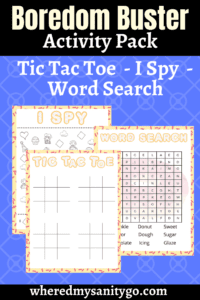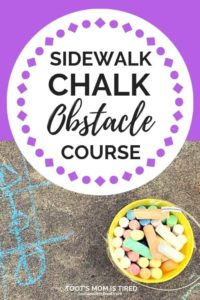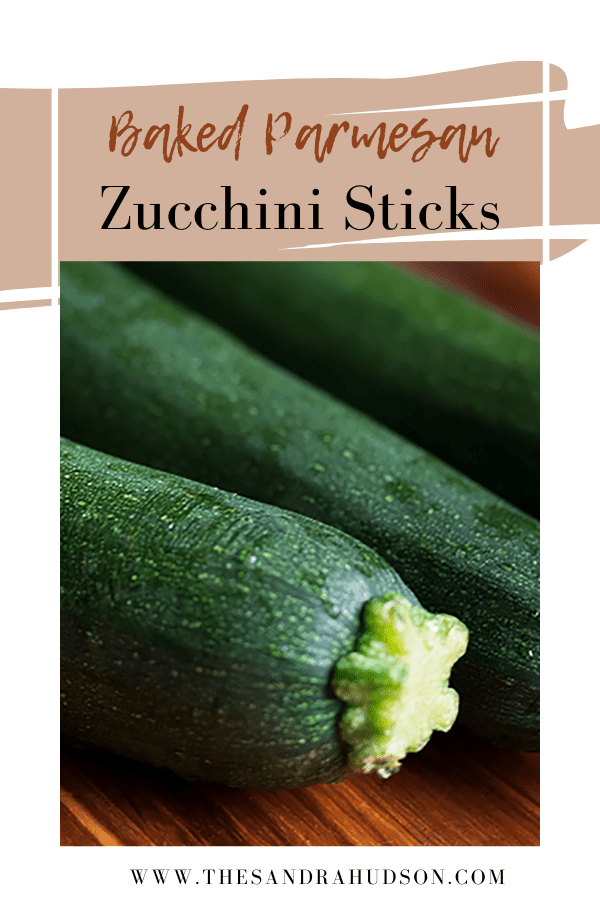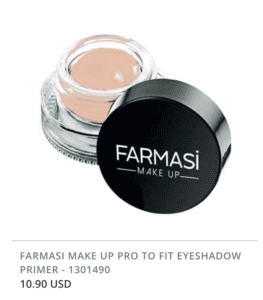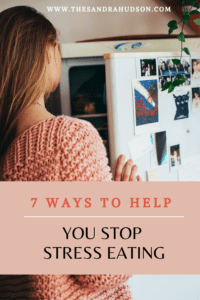
This post contains affiliate links. This means I may receive a small commission should you choose to purchase through one of my links. I only recommend products and services I personally use, like, know and trust.
Stress is defined as a state of mental or emotional strain or tension resulting from adverse or very demanding circumstances. We have all experienced stress at some point in our lives, and right now, it’s higher than it should be.
Most of the country is practicing social distancing and quarantine right now. Not only are we worried about this very contagious disease spreading around the globe, but we are also worrying about homeschooling our kids, working from home, not having a job at all, or running out of toilet paper.
There is so much stress……… and it is very common to reach for food and eat our feelings when we are feeling stressed about work, family, or other things.
Unfortunately, this habit can make us overeat and ultimately gain weight, which can lead to feelings of depression and added stress.
I am determined to stay on track with my health as much as I can during this quarantine, and I want to share a few of the tips that are working for me to manage the stress eating, or even eating out of boredom. You too can take action now and stop the negative cycle.
Why Does Stress Make Us Hungry?
Eating isn’t only physical, but it is also psychological.
When you’re stress eating, you eat food for reasons other than to curb hunger.
During stress eating, you eat to satisfy your appetite or cravings for a certain food because you believe it will provide emotional relief.
Increase in Cortisol Levels
During stressful situations, your body releases a hormone called cortisol, which can boost your appetite and cravings for “unhealthy” foods.
Luckily, there are a few things you can do to make your way out of the stress eating cycle. Here are 7 ways to stop stress eating:
7 Ways to Help You Stop Stress Eating
1. Know Your Triggers
You are uniquely you. Since we’re all different, you must work on identifying the circumstances and emotions that cause you to reach for food outside of hunger.
Once you know your triggers, you can develop a plan to avoid them or prepare for them.
A good idea is to have a “replacement” activity for when cravings come, don’t just sit and try to push through it.
By not taking action, you’re constantly thinking about your cravings, so instead, go for a little walk or drive to clear your head. These are perfect activities you can do right now and safely practice social distancing. For example, when I want to binge on an unhealthy snack, I have been going outside and walking around the block instead.
2. Exercise to Reduce Stress

Studies have shown that people who are in shape tend to better handle the effects of stress.
This is because exercise produces chemical changes in the brain that reduce stress.
I know that for some, stress is the reason why they don’t feel like exercising. However, it’s important for the future you that you work on breaking this habit.
Just like you entered a habit of drifting in depression and stress, you can enter a habit of health and wellness.
Move your body every single day. Get outside and enjoy the fresh air. Go for a walk. Do some stretching or light yoga. Turn on your favorite playlist and have a dance party in your living room.
Related Post: 10 Ways to Avoid Weight Gain
3. Meditate or Pray

Many people underestimate the power of being alone with their minds. They are often impatient and feel the need to stay busy all the time. Right now, we have all the time in the world. Use it to create this new, healthy habit.
Meditation helps calm the mind and slows your heart rate and breathing.
When you’re calmed and focused, you can also concentrate more and therefore make healthier food choices.
So consider setting up a specific time each day to meditate, you can use apps like Headspace and Unplug to help you out.
4. Stay Connected to Your Friends and Family

If you’re a habitual stress eater, consider asking a really good friend or family member to help you out. Be honest and open about what you’re going through and how you’d like them to help you.
A good way they can help is by being open to letting you call them whenever you feel stressed.
During the call, they can remind you about your nutrition goals and motivate you with positive talk, and you can talk out your feelings and decompress.
Join a health or fitness challenge with a friend. There are so many free options out there right now, and it would be fun to do it together.
5. Just Breathe

When you feel like a stressful situation is taking the best out of you, stop and breathe deeply for a few minutes.
You’ll want to breathe in through your stomach, not your chest, let it fill up, hold it for a few seconds, release, and repeat for a few minutes.
This will improve oxygen flow in your body, relax your muscles, keep your mind off the stress, and lower your cortisol levels. A friend recently recommended an app called iBreathe and it’s great!
6. Eat More Nutrient-Dense Foods
Mixing physical and psychological hunger is something to be aware of. When this happens, you’re not only eating for fullness, but for comfort as well.
This can be dangerous because comfort foods are often fatty and sugary, high-calorie, and not filling at all, which is why it’s easier to overeat them.
To reduce your chances of overeating, you may want to plan more nutrient-dense meals.
Consider having at least 1 serving of green vegetables and at least 20 grams of protein at each meal. This is one reason why I love smoothies. It’s a great way to get more protein in your diet. They are quite tasty and very filling.
I love the Vital Proteins Collagen Peptides. (It can be ordered from Amazon or found at your local grocery.)
Also, consider eating nutrient-dense carbohydrates, such as sweet potatoes, quinoa, beans, legumes, whole grains, and fruits.
7. Get More Sleep
Lack of sleep causes changes in hormones that may favor an increase in food consumption and lead to weight gain.
It can also increase stress, which leads to increased cortisol levels, that can, as previously mentioned, boost appetite and cravings.
It’s recommended that adults get between 7-8 hours of sleep. A few tips to get you relaxed for a night of deep sleep:
Relax in a detox bath.
Use essential oils or a refreshing pillow mist.
Use a sleeping mask. I swear by mine. Once you get used to it, you will never go back to sleeping without one.
The Bottom Line
You can totally do this! Learn to understand and listen to your body to be able to know the difference between actual hunger and stress triggers.
It might take some time, but I KNOW you can do it. You’ve got this! Please share any of your tips in the comments.
*Disclaimer – I am not a doctor. If you think you need to see your doctor about your stress, then do it! Don’t hesitate!
Looking for more ways to relax and make time for yourself right now? Sign up to receive my FREE 30 Day Self Care Challenge HERE.












